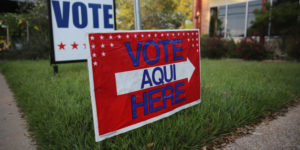
The Hispanic community might be the fastest-growing population in Texas, but it is highly underrepresented in local and state politics, according to a new report.Hispanics make up more than 38 percent of the population in the Lone Star State — yet only about 10 percent of Texas mayors and county judges are Hispanic.
The Austin American-Statesman reported more than 1.3 million Hispanics across Texas live in cities or counties that have no Hispanic representation on their city council and county commissioners courts. The disparities remain high even when accounting for non-citizens. Lydia Camarillo, vice president of the Southwest Voter Registration Education Project, said that while some areas of the state — notably South Texas — have seen sharp rises in the number of Latinos elected to local office, the Statesman’s findings show “there is still disparity in your face” across Texas.
In county government, Latino representation has largely stagnated during the past two decades. In 1994, Latinos made up 10 percent of county commissioner positions; today, the percentage has inched up to 13 percent — even though the state’s Hispanic population nearly doubled during that time. While the most glaring disparities are clustered in a largely rural swath of West Texas, through the High Plains region and into the Panhandle, the newspaper’s analysis found similar patterns across the state.
Medina County, just outside San Antonio, has a 50 percent Latino population but no Hispanic county commissioners. Odessa, where 63 percent of city residents are Hispanic, has just one Hispanic city council member. The most underrepresented areas also tend to be heavily Republican, which observers say also limits the participation of Texas Hispanics, who more often vote Democratic. In Medina County, County Judge Chris Schuchart said he believes the lack of Hispanic elected officials is more attributable to party than to ethnicity. “The county votes Republican, and … we generally have very few Democrats on the local ballot,” he said.
Statewide election experts and Hispanic officeholders in some of the state’s most underrepresented regions say the disparity defies easy explanation. They point out several factors: Texas laws that have made registering to vote more difficult; redistricting efforts designed to dilute Hispanic influence; and a virtual abandonment by statewide political parties. And even in districts with favorable demographics, Hispanics often turn out to vote in small numbers.

Recent Comments